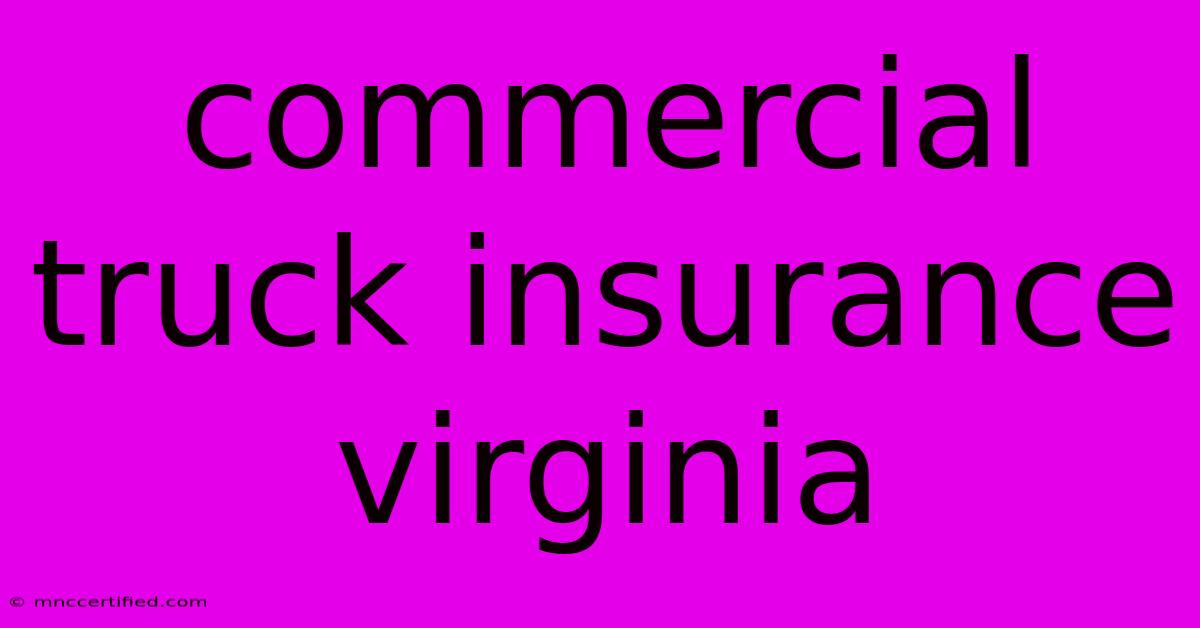Commercial Truck Insurance Virginia

Table of Contents
Navigating the Roads of Virginia: A Guide to Commercial Truck Insurance
Running a trucking business in Virginia means more than just navigating the state's scenic highways. It also involves understanding the complexities of commercial truck insurance. This essential coverage protects your business and drivers from financial ruin in the event of an accident, injury, or other unforeseen events.
This comprehensive guide will delve into the nuances of commercial truck insurance in Virginia, providing you with the knowledge you need to make informed decisions and ensure your business is adequately protected.
Why is Commercial Truck Insurance Essential in Virginia?
Commercial truck insurance is not just a legal requirement in Virginia; it's a lifeline for your business. Here's why:
- Legal Compliance: Virginia law mandates that all commercial trucks operating within the state carry specific types of insurance, including liability, cargo, and physical damage coverage. Failure to comply can result in hefty fines, license suspension, and even jail time.
- Financial Protection: Accidents happen, and the costs associated with them can be devastating. Commercial truck insurance shields your business from financial ruin by covering legal fees, medical expenses, property damage, and other related costs.
- Peace of Mind: Knowing you have adequate coverage in place allows you to focus on running your business without the constant worry of potential financial disaster.
Types of Commercial Truck Insurance in Virginia
Choosing the right type of commercial truck insurance depends on the specific needs of your business. Here are some key types of coverage:
1. Liability Insurance:
- Bodily Injury Liability: Covers bodily injuries sustained by others in an accident caused by your truck.
- Property Damage Liability: Covers damages to other vehicles or property caused by your truck.
2. Cargo Insurance:
- Protects your cargo from damage or loss during transportation, covering theft, accidents, and other perils.
3. Physical Damage Coverage:
- Collision: Covers damage to your truck in an accident, regardless of fault.
- Comprehensive: Covers damage to your truck from events like theft, fire, vandalism, and natural disasters.
4. Other Important Coverages:
- Uninsured/Underinsured Motorist: Protects you if you're involved in an accident with a driver who doesn't have adequate insurance.
- Medical Payments: Covers medical expenses for your driver and passengers, regardless of fault.
- Non-Truck Liability: Covers liability for damage or injuries caused by other activities associated with your business, like loading or unloading cargo.
Factors Affecting Your Insurance Premiums
Several factors influence the cost of your commercial truck insurance in Virginia:
- Type of Truck: The size, weight, and age of your truck affect premiums.
- Driving History: A clean driving record translates into lower premiums.
- Cargo Value: The value of the cargo you transport influences your cargo insurance premiums.
- Business Operations: The type of goods you haul, your delivery routes, and your safety program all play a role.
- Credit Score: Your credit history can impact your insurance premium.
Getting the Right Coverage
1. Consult with an Insurance Agent: An experienced agent specializing in commercial truck insurance can help you identify your specific needs and tailor a policy that offers adequate protection at a competitive price.
2. Compare Quotes: Don't settle for the first quote you receive. Shop around and get quotes from multiple reputable insurance companies.
3. Understand Your Policy: Read your policy carefully and ask questions about anything that's unclear. Ensure you understand the coverage limits, deductibles, and exclusions.
4. Maintain a Safe Driving Record: The most effective way to lower your premiums is to prioritize safety. Implement safety programs, provide driver training, and enforce strict driving rules.
5. Consider Risk Management Strategies: Implement safety practices, invest in vehicle maintenance, and track your driving records to minimize risks and potential claims.
Conclusion:
Commercial truck insurance is a critical investment for any trucking business in Virginia. By understanding the different types of coverage, considering your specific needs, and engaging with knowledgeable insurance agents, you can ensure your business is adequately protected. Remember, navigating the roads of Virginia safely and confidently requires both skilled drivers and the right insurance to weather any storm.

Thank you for visiting our website wich cover about Commercial Truck Insurance Virginia. We hope the information provided has been useful to you. Feel free to contact us if you have any questions or need further assistance. See you next time and dont miss to bookmark.
Featured Posts
-
Example Of Certificate Of Insurance
Nov 13, 2024
-
Cost Of Streaming Deadpool And Wolverine
Nov 13, 2024
-
Georgia Boat Insurance Requirements
Nov 13, 2024
-
Trump Taps Fox News Hegseth For Defense Role
Nov 13, 2024
-
Doves Return To Stage In 2023
Nov 13, 2024